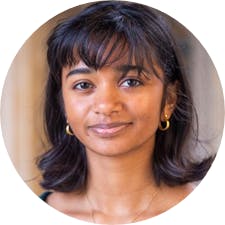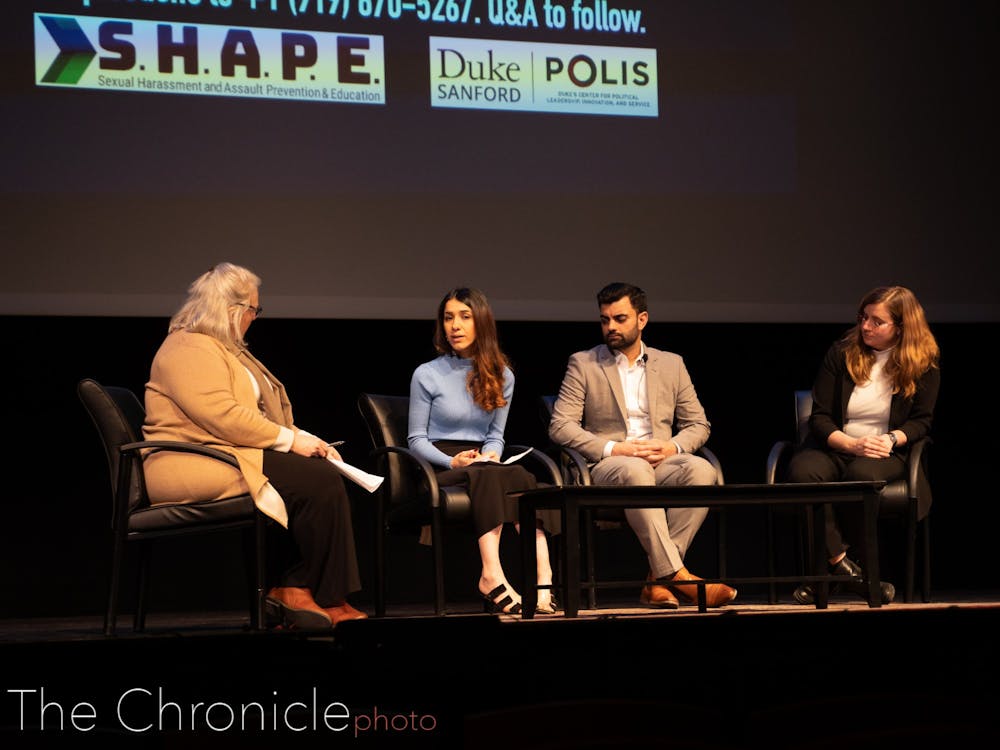At the culminating event of the Sexual Harassment and Assault Prevention and Education (SHAPE) week, Nadia Murad, a 2018 Nobel Peace Prize Laureate, discussed the power of unity and the goals of Nadia’s Initiative, her project aimed at promoting global advocacy for the Yazidi people.
Murad’s talk was the finale for SHAPE week—a series of events and presentations coordinated by Duke Student Government ad-hoc senators Eden Schumer and Jake Jeffries, both sophomores. Sunday evening, Murad was joined onstage in Page Auditorium, where she last spoke in 2018, by Abid Shamdeen and Olivia Wells, executive director and director of programs of Nadia’s Initiative, respectively. The trio shared their experiences of the tragic events that took place in Nadia’s hometown of Sinjar, Iraq, which was attacked by ISIS Aug. 3, 2014.
Security forces quickly fled to northern Iraq, Shamdeen recalled. While the U.S. government aided the people with limited airstrikes that created a corridor for escape and some Yazidis were able to evade the attack, many were left behind—and thousands of Yazidis, including Murad’s family members, were enslaved, captured, killed or displaced.
“You would think that the mass enslavement of Yazidi women and children would have created an urgent response from the international community. However, to this day, no task force has been created to work on rescuing those still missing,” Murad said.
The ISIS fighters who carried out the attack have yet to be accountable, Murad pointed out.
“Unless we speak out and demand accountability, this violence will continue. Accountability challenges the notion that certain groups of people are ultimately without rights,” she said.
It is for this reason that she stressed that people must work together to challenge impunity and promote justice—a struggle that shouldn’t be hard for American students to conceptualize, she said.
“Though our struggles may appear different, our fight and goals are the same: to end all kinds of violence against women,” Murad said. “Women deserve peace and equality, whether they are living in [internally displaced person] camps in Iraq or attending classes on a university campus”.
Murad also spoke directly to young people, applauding them for calling out injustice in their communities and stating that she hopes the young people in the audience continue to use their voices to call out injustice and fight impunity.
Much of this change comes from sharing stories, and Murad made it clear that the stories of the Yazidi women have immense power.
Should anyone go visit the area, Murad said, you would meet thousands of women who lost their husbands and family members, yet these devastating stories have the ability to instill in all of us the power to speak “truth to power.”
“Early on, when the Yazidi women spoke about their stories, we didn’t actually believe that would bring a change. But eventually others spoke, and when people were speaking, we made sure that the whole world heard our stories and heard what happened to the Yazidi people,” Shamdeen translated for Murad. “Telling these stories has made a difference.”
However, Murad emphasized that the onus to make change through telling stories should not rest solely on these young activists, calling instead for collective responsibility.
“I believe it’s everyone’s responsibility, not just young people, to participate and demand change,” Murad said. “The fact is, it’s our responsibility to help, not only in our communities, but in others like Sinjar.”
Advocacy work through Nadia’s Initiative has been aimed at helping communities through various measures, from health to education, rehabilitating farms destroyed by ISIS to improving water sanitation and hygiene.
These measures are taken alongside the community, instead of remotely implemented—another feature of Nadia’s Initiative that stresses unity.
“We speak to the community. They tell us what they need, where the gaps are, and we design programs in tandem with the community,” Wells said.
A large part of the work of Nadia’s Initiative is also advocacy, Wells explained.
“It’s constantly advocating for other international organizations, other governments, the national governments, the local government, to advocate for the provision of quality healthcare, sanitation, women and advocacy at every single level: local, national, global,” Wells told the audience.
Murad made it clear that the group cannot force others to care about the problem.
Get The Chronicle straight to your inbox
Sign up for our weekly newsletter. Cancel at any time.
“It is our responsibility to inform people about what’s happening and to keep telling these stories and people can decipher for themselves whether they should get involved and support or not,” Shamdeen translated for Murad.

Preetha Ramachandran is a Trinity senior and diversity, equity and inclusion coordinator for The Chronicle's 118th volume. She was previously senior editor for Volume 117.

